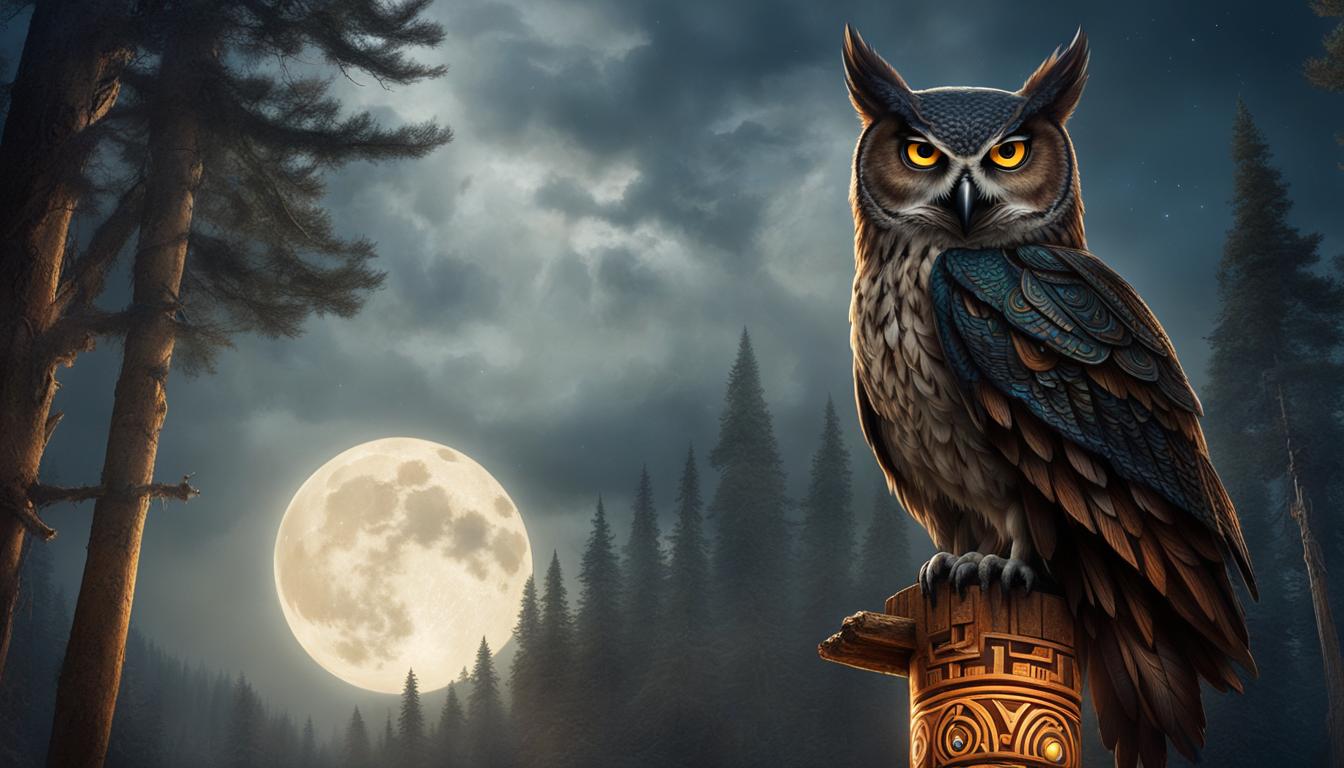Originally posted on January 24, 2024 @ 7:44 am
Are owls bad luck in Native American culture? What do these enigmatic creatures symbolize in indigenous beliefs? Explore the fascinating world of owl superstitions and the diverse Native American perspectives on these captivating birds.
Throughout history, owls have held a mystical allure, captivating the imaginations of many cultures. In Native American folklore, they play a significant role, symbolizing both positive and negative aspects. Let’s delve into the intriguing beliefs and superstitions surrounding owls in Native American culture.
Key Takeaways:
- Owls are associated with bad omens and danger in many Native American tribes.
- Some tribes view owls as protective spirits and carriers of ancient wisdom.
- Owls hold diverse symbolism, representing wisdom, authority, and connection to the spirit world.
- Beliefs about owls vary among different Native American tribes, reflecting their cultural and spiritual perspectives.
- Owl superstitions serve as cautionary tales and reminders of the power attributed to these mystical creatures.
The Significance of Owls in Native American Folklore
In Native American folklore, owls hold significant symbolism. They are often associated with wisdom, as seen in tribes like the Hopi, who consider owls as symbols of authority and wisdom. The owl’s ability to see in the dark and move silently has led some tribes, like the Cheyenne and warrior tribes of the plains, to attach owl feathers to their shields, believing it would grant them special powers. Owls are also believed to bring news and knowledge to medicine men in tribes such as the Cherokee and Lakota. Overall, owls play diverse and complex roles in Native American folklore, representing both positive and negative aspects.
Native American Tribes and the Negative Connotations of Owls
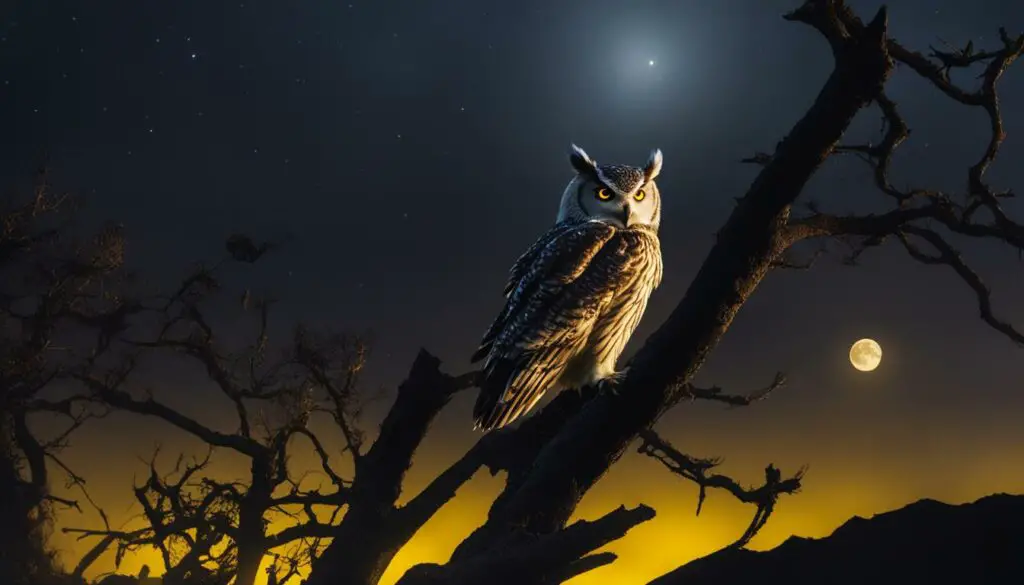
Many Native American tribes across the country view owls as bad omens or bringers of misfortune. This perception is rooted in cultural beliefs that link owls to death and the spirit world. Tribes like the Alabama, Caddo, Catawba, Choctaw, Ojibway, Cherokee, and Cheyenne consider certain owl species, particularly the Great Horned Owl and Screech Owl, as the most dangerous. These owls’ horn-like feather tufts and their association with the night and death contribute to their negative connotations. The belief in owls as bad omens varies among different tribes and reflects their cultural and spiritual perspectives.
For instance, the Alabama tribe believes that owls are the spirits of witches, bringing dark magic and misfortune. In their folklore, owls are the enemies of the sun and represent the shadowy forces of the night. The Catawba tribe sees owls as messengers of illness and impending death, associating their hooting with the approaching end. Similar beliefs are shared among the Choctaw and Ojibway tribes, who perceive owls as harbingers of death and disaster.
The negative connotations of owls in Native American traditions go beyond mere superstitions. They are deeply woven into the fabric of tribal culture, shaping their worldview and guiding their behaviors and actions.
However, it is important to note that not all Native American tribes share these negative views of owls. The Hidatsas and Dakota tribes, for example, hold more positive beliefs about owls. They consider owls as guardians and protectors, particularly for their warriors. Owls are seen as spiritual guides and are believed to bring ancient knowledge and wisdom.
These diverse perspectives on owls within Native American tribes reflect the rich tapestry of cultural beliefs and spiritual traditions that have been passed down through generations. The negative connotations associated with owls are deeply rooted in the spiritual and mythical traditions of specific tribes, while other tribes regard them as symbols of protection and wisdom.
Owls in Native American Spirituality
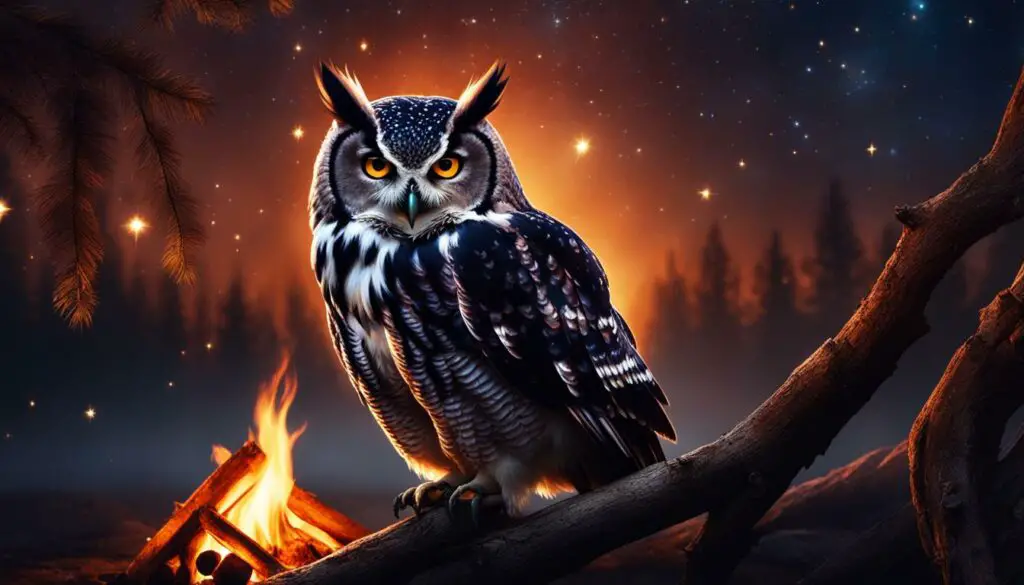
Owls hold a significant place in the spirituality of many Native American cultures. Different tribes have diverse traditional views and beliefs about owls and their connection to the spirit world. For tribes like the Lakota, Omaha, Cheyenne, Fox, Ojibwa, Menominee, Cherokee, and Creek, owls are believed to be the embodied spirits of the dead or possess a strong connection to the spiritual realm.
In these cultures, owls are considered spiritual guides and messengers, offering ancient knowledge and mystical wisdom to those who seek it. They are seen as intermediaries between the physical and spiritual planes, capable of granting spiritual insights and providing guidance to individuals on their spiritual journeys.
Furthermore, owls are used as symbolic warnings in Native American spirituality, particularly for children. They are often associated with lessons on good behavior, obedience, and respect for the spiritual world. Owls serve as reminders of the consequences that may arise from disregarding these teachings.
Owls in Native American Spirituality: An Example from the Lakota Tribe
“In Lakota spirituality, the owl is known as Haṡkęyaa (hass-kay-yah), which translates to ‘ghost’ or ‘spirit.’ It is believed that when an owl crosses your path or appears in your dreams, it is a sign from the spirit realm. Owls are seen as sacred messengers, carrying spiritual wisdom and ancestral knowledge. The Lakota people deeply respect and honor the presence of owls, understanding their role as guardians of spiritual teachings.”
The reverence for owls in Native American spirituality reflects the deep connection between nature and the spiritual beliefs of these indigenous cultures. Owls are seen as powerful and mystical beings that hold a unique place in the spiritual realm.
| Tribes | Beliefs about Owls |
|---|---|
| Lakota | Owls as spiritual messengers and carriers of ancestral wisdom |
| Omaha | Owls as intermediaries between the physical and spiritual realms |
| Cheyenne | Owls as guides and protectors on spiritual journeys |
| Fox | Owls as carriers of spiritual messages and insights |
| Ojibwa | Owls as keepers of ancient knowledge and spiritual wisdom |
The use of owls in Native American spirituality illustrates the profound respect for nature and the spiritual interconnectedness that these tribes embrace. Owls are seen as divine beings that offer guidance, protection, and the illumination of spiritual truths. These traditional beliefs continue to shape the perspectives and practices of Native American communities today.
Owl Superstitions in Native American Communities
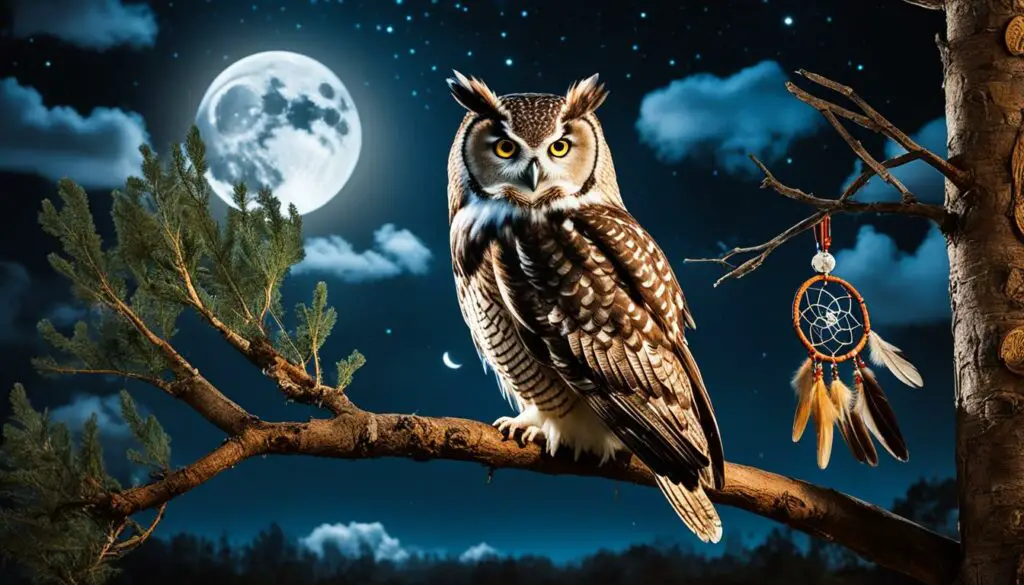
Owl superstitions are prevalent in many Native American communities. Some tribes hold strong beliefs that seeing an owl, especially during the day, is a sign of impending death or a negative event. In these cultures, owls may be regarded as witches or shape-shifters who bring bad luck.
“The owl hoots in the night, and the next day brings fright.”
Stories abound of owl encounters being followed by tragedies or accidents, further reinforcing these superstitions. The fear and caution associated with owls in Native American culture serve as cautionary tales, reminding people to respect the power and symbolism attributed to these remarkable birds.
Negative Connotations
The negative connotations surrounding owls in Native American tribes stem from their association with death and the spirit world. Some tribes, including the Alabama, Caddo, Catawba, Choctaw, Ojibway, Cherokee, and Cheyenne, consider certain owl species, such as the Great Horned Owl and Screech Owl, as the most dangerous and harbingers of doom.
Cautionary Tales
Owl superstitions serve as cautionary tales within Native American communities, instilling in individuals a healthy respect for the power and symbolism attributed to these birds. By associating owls with negative events, tribes encourage their members to approach them with caution and reverence.
| Tribe | Superstition |
|---|---|
| Alabama | Seeing an owl during the day signifies an impending death. |
| Caddo | Owls are believed to be witches and bringers of dark magic. |
| Cherokee | Owls are associated with the spirit world and death. |
| Ojibway | The call of an owl is an omen of misfortune and bad luck. |
Owl Symbolism and Protection in Native American Customs
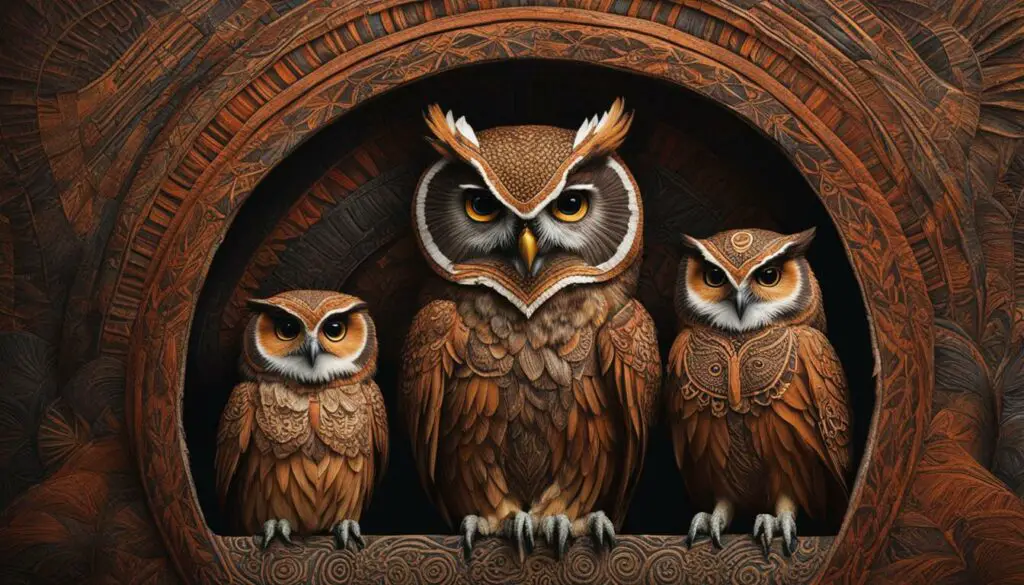
Despite the negative connotations associated with owls in some Native American beliefs, there are also instances where they are seen as protective beings. The Dakota and Hidatsas tribes, for example, view owls as protective spirits for brave warriors. The Lenape Indians consider dreaming about an owl to be a sign that it will become their guardian. These contrasting views highlight the complexity of owl symbolism in Native American mythology, where owls can embody both negative and positive qualities.
Native American traditions hold a deep reverence for nature and its creatures. Among these creatures, owls occupy a unique place in their folklore and spiritual practices. While some tribes associate owls with negative connotations and superstitions, others have embraced the mystical and protective qualities they believe owls possess.
“The great horned owl was known as the guardian of the night. In my tribe, we believed that if one were ever to encounter an owl during the day, it meant they were being watched over by an ancestral spirit.” – Kuwaapaya, Cheyenne Elder
This Cheyenne elder’s story exemplifies the belief in owls as protective spirits within the tribe. The owl’s presence during the day is seen as a powerful symbol, signifying the presence of ancestral guidance and protection.
The Dakota and Hidatsas tribes also hold a similar belief in the protective nature of owls. In their customs, owls are regarded as guardians for warriors, offering them spiritual protection as they navigate through dangerous situations.
Furthermore, the Lenape Indians associate dreams about owls with personal guardianship. If an individual dreams about an owl, it is believed that the owl will become their guardian spirit. This connection to owls as protectors highlights the positive aspect of owl symbolism in Native American mythology.
As with any cultural belief, the interpretations of owl symbolism in Native American customs vary among tribes and individuals. While some associate owls with negative connotations, others honor them as powerful spiritual beings who offer protection and guidance. The contrasting views reflect the rich diversity and complexities of Native American mythology, where owls encompass both positive and negative qualities.
| Tribes | Beliefs about Owls |
|---|---|
| Dakota | Owls as protective spirits for warriors |
| Hidatsas | Owls as guardians for brave warriors |
| Lenape | Dreaming about an owl as a sign of personal guardianship |
The table above summarizes the different Native American tribes and their beliefs about owls. It showcases the wide range of interpretations and the positive associations some tribes have with owls as protectors.
Overall, owl symbolism in Native American customs illustrates the intricate relationship between humans and nature. Owls, with their enigmatic presence and mystic qualities, continue to captivate and intrigue Native American communities, embodying both negative connotations and the potential for protection and guidance.
Personal Stories and Experiences with Owls in Native American Culture
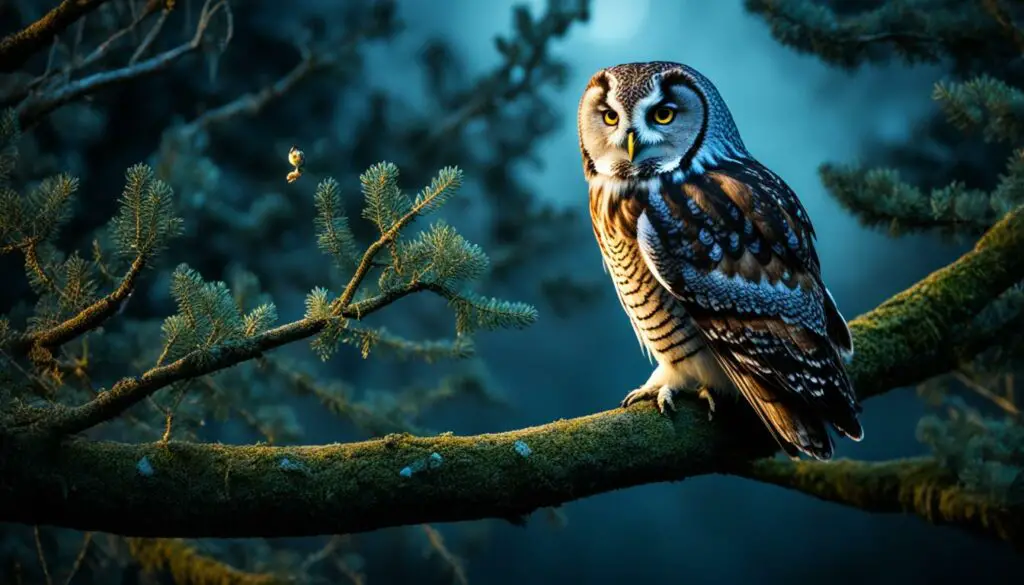
Personal stories and experiences provide valuable insights into the traditional views on owls in Native American spirituality and the beliefs surrounding these mysterious creatures. These accounts offer a glimpse into the deep-rooted cultural significance of owls and their enduring presence in Native American communities.
One such story is that of Grandma Elizabeth, a revered elder from the Cherokee tribe. She shared a powerful encounter she had with a Great Horned Owl during a sacred ceremony. As the owl soared overhead, Grandma Elizabeth felt a profound connection to the spirit world. She believed that the owl’s presence signified the guiding presence of her ancestors, bestowing their wisdom upon her.
“When the Great Horned Owl appeared that night, I knew it was a message from the spirits. The owl’s hooting echoed through the sacred space, and I felt a surge of ancestral energy flowing through me. It was a powerful reminder of the ancient wisdom that resides within our tribe.”
Similarly, Tom Red Eagle, a member of the Lakota tribe, shared his experience of using owl feathers for protection during a vision quest. According to Lakota tradition, owl feathers possess a spiritual power that can ward off negative energies and offer guidance in times of uncertainty. For Tom, these feathers served as a symbol of strength and connection to his heritage.
These personal stories and experiences reflect the deep reverence and respect that Native Americans hold for owls. The owl’s presence is seen as a spiritual manifestation, bridging the gap between the physical and spiritual realms and imparting ancient knowledge and wisdom.
Owls capture the imagination and serve as a conduit for divine messages in Native American culture, evoking awe and fascination. Their significance goes beyond mere superstition, intertwining with cultural beliefs, personal experiences, and ancestral traditions. These stories contribute to the rich tapestry of owl mythology and beliefs, highlighting the enduring presence of these enigmatic birds in Native American communities.
Owls in Modern Native American Perspectives
Native American perspectives on owls have evolved over time. While some individuals still hold steadfast to traditional beliefs about owls as omens of death and supernatural entities, others have moved away from such beliefs. Modern Native Americans may embrace a blend of traditional customs and contemporary perspectives, acknowledging the significance of owls in their culture while recognizing the diversity of views within their communities. The role of owls in Native American culture continues to be shaped by individual beliefs, personal experiences, and the influence of changing times.
| Traditional Beliefs | Modern Perspectives |
|---|---|
| Some Native Americans still view owls as omens of death and supernatural beings. | Many individuals have adopted a more nuanced understanding of owls, appreciating their symbolism while not attributing them solely to negative connotations. |
| Belief in owl superstitions remains prevalent in certain tribes. | Some Native Americans have re-evaluated owl superstitions and prioritize a more balanced perspective on the role of owls in their culture. |
| Traditional customs heavily influenced by owl symbolism persist in some communities. | Modern Native Americans often integrate traditional owl symbolism with contemporary interpretations, highlighting the fluidity of cultural beliefs. |
Individuals within Native American communities may differ in their perception of owls, influenced by personal experiences and exposure to diverse viewpoints. While some still regard owls as bearers of ill fortune and supernatural entities, others have embraced a more nuanced understanding. This evolution in perspectives reflects the ongoing transformation of Native American culture and the impact of modern influences.
Through continued cultural dialogue and exploration, Native American communities navigate the delicate balance between preserving ancestral traditions and adapting to the changing world. The significance of owls in modern Native American perspectives underscores the complexity and richness of their cultural heritage.
Conclusion
Owls hold a significant and intriguing role in the cultural beliefs of Native American tribes. These enigmatic birds are both venerated and feared, with different tribes attributing diverse symbolism and interpretations to them. While some tribes associate owls with negative superstitions and the realm of death, others revere them as wise and protective spirits. The cultural significance of owls in Native American folklore is shaped by personal stories, ancestral traditions, and deeply ingrained beliefs.
The multifaceted nature of owl superstitions and cultural beliefs surrounding them showcases the complexity of their role in Native American communities. From their association with bad omens and misfortune to being revered as guardians of ancient knowledge and wisdom, owls embody contrasting qualities in indigenous cultures. Personal experiences and cultural upbringing contribute to the diverse perspectives on owls within Native American tribes, adding depth to the rich tapestry of owl mythology.
Despite the evolving perspectives and changing times, owls continue to occupy a special place in Native American folklore. Their symbolism and significance transcend generations, reflecting the enduring power and mystery of these majestic creatures. Whether considered as harbingers of death or protectors of spiritual wisdom, owls remain integral to Native American cultural traditions and serve as captivating symbols of the indigenous heritage.
FAQ
Are owls considered bad luck in Native American culture?
Among many Native American tribes, owls have been associated with bad omens and considered to be dangerous. Some tribes link owls to death and the afterlife, viewing their appearance during the day as a harbinger of death.
How are owls symbolized in Native American folklore?
Owls are often associated with wisdom in Native American folklore. They are considered symbols of authority and wisdom by tribes like the Hopi. Owls’ ability to see in the dark and move silently has led some tribes, like the Cheyenne, to attach owl feathers to their shields, believing it would grant them special powers.
Do all Native American tribes view owls as bad omens?
Many Native American tribes view owls as bad omens or bringers of misfortune. However, there are tribes, like the Dakota and Hidatsas, who view owls as protective spirits for warriors, and the Lenape Indians consider dreaming about an owl to be a sign that it will become their guardian.
How do Native American tribes incorporate owls in their spirituality?
Some Native American tribes believe that owls are embodied spirits of the dead or have a strong connection to the spirit world. They may serve as spiritual guides or messengers, providing ancient knowledge and mystical wisdom.
Are there superstitions surrounding owls in Native American communities?
Yes, owl superstitions are prevalent in many Native American communities. Some tribes believe that seeing an owl, especially during the day, is a sign of impending death or a negative event. Owls may be regarded as witches or shape-shifters who bring bad luck.
Do owls have positive connotations in Native American mythology?
Yes, despite the negative associations, there are tribes that view owls as protective beings. The Dakota and Hidatsas tribes, for example, view owls as protective spirits for brave warriors.
What role do personal stories play in Native American beliefs about owls?
Personal stories and experiences contribute to the understanding and significance of owls in Native American culture. These stories range from encounters that forewarn of tragic events to the use of owl feathers for protection and special powers.
How have Native American perspectives on owls evolved over time?
While some individuals still hold steadfast to traditional beliefs about owls as omens of death and supernatural entities, others have moved away from such beliefs. Modern Native Americans may embrace a blend of traditional customs and contemporary perspectives.
